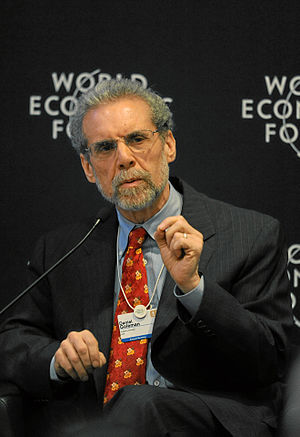
“Gifted leadership occurs when heart and head--feeling and thought--meet. These are the two winds that allow a leader to soar.”
Share this quote:
“Societies can be sunk by the weight of buried ugliness.”
Share this quote:
“For the high achievers, studying gave them the pleasing, absorbing challenge o flow 40 percent of the hours they spent at it. But for low achievers, studying produced flow only 16 percent of the time; more often that not, it yielded anxiety, with the demands outreaching their abilities”
Share this quote:
“In the new workplace, with its emphasis on flexibility, teams and a strong customer orientation, this crucial set of emotional competencies is becoming increasingly essential for excellence in every job in every part of the world,”
Share this quote:
“We are being judged by a new yardstick: not just how smart we are, or by our training and expertise, but also by how we handle ourselves and each other.”
Share this quote:
“Life without passion would be a dull wasteland of neutrality, cut off and isolated from the richness of life itself.”
Share this quote:
The Responsive Classroom approach creates an ideal environment for learning--every teacher should know about it.
Share this quote:
In a very real sense we have two minds, one that thinks and one that feels
Share this quote:
Self-absorption in all its forms kills empathy, let alone compassion. When we focus on ourselves, our world contracts as our problems and preoccupations loom large. But when we focus on others, our world expands. Our own problems drift to the periphery of the mind and so seem smaller, and we increase our capacity for connection - or compassionate action.
Share this quote:
The argument has long been made that we humans are by nature compassionate and empathic despite the occasional streak of meanness, but torrents of bad news throughout history have contradicted that claim, and little sound science has backed it. But try this thought experiment. Imagine the number of opportunities people around the world today might have to commit an antisocial act, from rape or murder to simple rudeness and dishonesty. Make that number the bottom of a fraction. Now for the top value you put the number of such antisocial acts that will actually occur today. That ratio of potential to enacted meanness holds at close to zero any day of the year. And if for the top value you put the number of benevolent acts performed in a given day, the ratio of kindness to cruelty will always be positive. (The news, however, comes to us as though that ratio was reversed.)Harvards Jerome Kagan proposes this mental exercise to make a simple point about human nature: the sum total of goodness vastly outweighs that of meanness. Although humans inherit a biological bias that permits them to feel anger, jealousy, selfishness and envy, and to be rude, aggressive or violent, Kagan notes, they inherit an even stronger biological bias for kindness, compassion, cooperation, love and nurture – especially toward those in need. This inbuilt ethical sense, he adds, is a biological feature of our species.
Share this quote:
Threats to our standing in the eyes of others are remarkably potent biologically, almost as powerful as those to our very survival.
Share this quote:
My hope was that organizations would start including this range of skills in their training programs - in other words, offer an adult education in social and emotional intelligence.
Share this quote:
A little girl who finds a puzzle frustrating might ask her busy mother (or teacher) for help. The child gets one message if her mother expresses clear pleasure at the request and quite another if mommy responds with a curt Dont bother me - Ive got important work to do.
Share this quote:
People tend to become more emotionally intelligent as they age and mature.
Share this quote:
Empathy and social skills are social intelligence, the interpersonal part of emotional intelligence. Thats why they look alike.
Share this quote:
The emotional brain responds to an event more quickly than the thinking brain.
Share this quote:
But once you are in that field, emotional intelligence emerges as a much stronger predictor of who will be most successful, because it is how we handle ourselves in our relationships that determines how well we do once we are in a given job.
Share this quote:
Emotional intelligence begins to develop in the earliest years. All the small exchanges children have with their parents, teachers, and with each other carry emotional messages.
Share this quote:
When I went on to write my next book, Working With Emotional Intelligence, I wanted to make a business case that the best performers were those people strong in these skills.
Share this quote:
Emotional literacy implies an expanded responsibility for schools in helping to socialize children. This daunting task requires two major changes: that teachers go beyond their traditional mission and that people in the community become more involved with schools as both active participants in childrens learning and as individual mentors.
Share this quote: